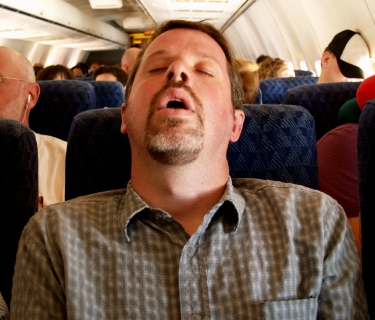
Have you ever come down with a cold after flying? Or maybe felt sick after a hotel stay? If so, you’re not alone. But don’t worry: There are ways to reduce your exposure to germs and contaminated air while traveling.
In airplanes, toxic fuel fumes and recirculated air (spreading the germs from previous passengers) all contribute to a less-than-stellar air quality environment. Airplane air can also be especially toxic due to engine oil leaking into the aircraft air supply, according to Susan Michaelis, global cabin air quality executive researcher and former Australian airline pilot.
“There is … evidence showing air crew and passengers can suffer not only acute short-term effects, but some may become unwell with a range of chronic ill health effects, now being termed ‘aerotoxic syndrome’,” says Michaelis. Both frequent flyers and occasional travelers can be at risk.
Precautions you can take include:
- If you feel ill from breathing the airplane’s air, notify the cabin crew, especially if symptoms develop pre-taxiing or take-off. Ask for assistance and also request that they record the problem for reporting/analysis purposes.
- Use a face mask. Adding an extra filter may reduce exposure to airborne germs.
- To avoid cold and flu bugs from other passengers, drink plenty of water and use hand sanitizer frequently. You may also find it beneficial to take an herbal supplement that purports to boost the immune system.
On the accommodations front, there’s no shortage of [% 2496847 | | dirty hotel stories %], ranging from [% 2514233 | | bedbugs %] to dirty linens, mold and mildew to smoky air. Even high-end properties aren’t immune to charges of uncleanliness— just visit any city page on SmarterTravel.com’s sister site [[ TripAdvisor | TripAdvisor ]] to see what I mean. To avoid most hotel room germs, take the following precautions:
- When one is available, request an allergy-free room. Many hotels now offer rooms outfitted by PURE Solutions, a company that strives to create hotel accommodations specifically for asthma and allergy sufferers. Rooms have treated air, water, furniture, and linens to ensure a healthy stay. The PURE website has a directory of U.S. hotels with allergy-free rooms.
- Avoid hotels that allow smoking. Many hotels are now smoke-free, or only allow smoking in designated areas. If your hotel does permit smoking, ask the staff to put you on a non-smoking floor.
- Ask about your hotel’s policy on pets. [[Pet travel | Pet travel ]] has been booming in recent years, with many hotels and B&Bs now allowing dogs and cats to accompany owners on their trips. If you have allergies to four-legged creatures, however, this may make your hotel stay less than comfortable. Look for “no pets” properties or, if your hotel does allow pets, request a pet-free floor and/or room.
There’s always going to be risk of exposure to new germs when traveling. By taking precautions, however, you can minimize the risks.
Have a great travel tip you’d like to share? Send your insider travel strategies to editor@smartertravel.com.
We hand-pick everything we recommend and select items through testing and reviews. Some products are sent to us free of charge with no incentive to offer a favorable review. We offer our unbiased opinions and do not accept compensation to review products. All items are in stock and prices are accurate at the time of publication. If you buy something through our links, we may earn a commission.
Related
Top Fares From
Today's Top Travel Deals
Brought to you by ShermansTravel
France: 8-Night Paris, Avignon & Nice...
Infinity Worldwide Vacations
 vacation
$2880+
vacation
$2880+
Poconos: 3 Nts in Garden of...
ResortsAndLodges.com
 hotel
$305+
hotel
$305+
7-Nt Canada & New England Cruise,...
Princess Cruises
 cruise
$839+
cruise
$839+



